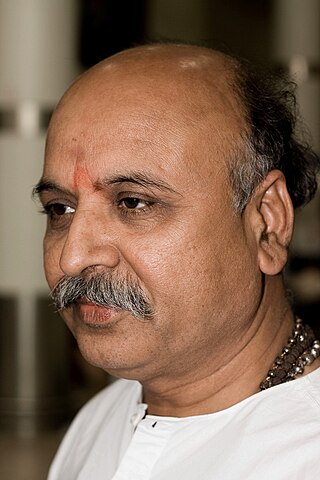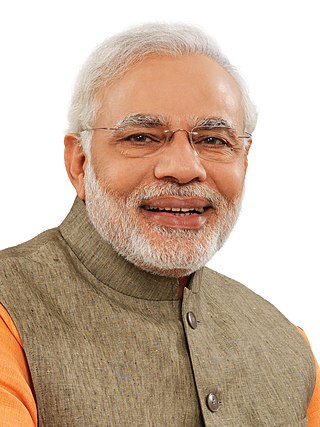Related Research Articles

Narendra Damodardas Modi is an Indian politician who has served as Prime Minister of India since 2014. Modi was the chief minister of Gujarat from 2001 to 2014 and is the member of parliament (MP) for Varanasi. He is a member of the Bharatiya Janata Party (BJP) and of the Rashtriya Swayamsevak Sangh (RSS), a right-wing Hindu nationalist paramilitary volunteer organisation. He is the longest-serving prime minister outside the Indian National Congress.

Teesta Setalvad is a controversial Indian civil rights activist and journalist. She is the secretary of Citizens for Justice and Peace (CJP), an organisation formed to advocate for the victims of 2002 Gujarat riots.

Pravin Togadia is an Indian doctor, cancer surgeon and an advocate for Hindu nationalism, coming from the state of Gujarat. He was the former International Working President of the Vishva Hindu Parishad (VHP) and a cancer surgeon by qualification. He is Founder and Current President of Antarashtriya Hindu Parishad. He had a falling-out with the Sangh Parivar and is a vocal critic of Narendra Modi.

Rajdeep Sardesai is an Indian news anchor, reporter, journalist and author. He is a consulting editor and anchor of India Today Television. He was the Editor-in-Chief of Global Broadcast News, that included CNN-IBN, IBN7 and IBN-Lokmat, before resigning in July 2014.

Asaduddin Salahuddin Owaisi is an Indian politician, who is the President of the All India Majlis-e-Ittehadul Muslimeen (AIMIM). He is a five time Member of Parliament representing the Hyderabad constituency in Lok Sabha, the lower house of the Indian Parliament. For years, he has been regularly listed by Royal Islamic Strategic Studies Centre (RISSC), among the 500 Most Influential Muslims of the world.
Dhirubhai Shah was a politician from Gujarat, who was elected speaker of the Tenth Gujarat Legislative Assembly from 19 March 1998 to 27 December 2002. He was the youngest speaker in the history of the Gujarat Legislative Assembly.

The 2002 Gujarat riots, also known as the 2002 Gujarat violence or the Gujarat pogrom, was a three-day period of inter-communal violence in the western Indian state of Gujarat. The burning of a train in Godhra on 27 February 2002, which caused the deaths of 58 Hindu pilgrims and karsevaks returning from Ayodhya, is cited as having instigated the violence. Following the initial riot incidents, there were further outbreaks of violence in Ahmedabad for three months; statewide, there were further outbreaks of violence against the minority Muslim population of Gujarat for the next year.
Haren Pandya was the Home Minister of Gujarat in India. He was murdered in 2003 in Ahmedabad, Gujarat, when he was sitting in his car, after a morning walk in the Law Garden area in Ahmedabad.

General elections were held in India in nine phases from 7 April to 12 May 2014 to elect the members of the 16th Lok Sabha. With 834 million registered voters, they were the largest-ever elections in the world until being surpassed by the 2019 election. Around 23.1 million or 2.71% of the total eligible voters were aged 18–19 years. A total of 8,251 candidates contested the 543 elected Lok Sabha seats. The average election turnout over all nine phases was around 66.40%, the highest ever in the history of Indian general elections until 2019 election.

The Gulbarg Society massacre took place on 28 February 2002, during the 2002 Gujarat riots, when a crowd started stone pelting the Gulbarg Society, a Muslim neighbourhood in the eastern part of Chamanpura, Ahmedabad in the Indian state of Gujarat. Most of the houses were burnt, and at least 35 victims, including a former Congress Member of Parliament, Ehsan Jafri, were burnt alive, while 31 others went missing after the incident, later presumed dead, bringing the total deaths to 69.

Amitbhai Anilchandra Shah is an Indian politician who is currently serving as the 32nd Minister of Home Affairs since May 2019 and the 1st Minister of Co-operation since July 2021. He is also the member of parliament (MP) for Gandhinagar. He served as the 10th president of the Bharatiya Janata Party (BJP) from 2014 to 2020. He has also served as chairman of the National Democratic Alliance (NDA) since 2014. He had been elected as a member of the upper house of parliament, Rajya Sabha, from Gujarat from 2017 to 2019.
Sanjiv Bhatt is a former Indian Police Service officer of the Gujarat-cadre. He is known for his role in filing an affidavit in the Supreme Court of India against the then Chief Minister of Gujarat, Narendra Modi, concerning Modi's alleged role in the 2002 Gujarat riots. He claimed to have attended a meeting, during which Modi allegedly asked top police officials to let Hindus vent their anger against the Muslims. However, the Special Investigation Team appointed by the Supreme Court of India concluded that Bhatt did not attend any such meeting, and dismissed his allegations.

The Naroda Patiya massacre took place on 28 February 2002 at Naroda, in Ahmedabad, India, during the 2002 Gujarat riots. 97 Muslims were killed by a mob of approximately 5,000 people, organised by the Bajrang Dal, a wing of the Vishva Hindu Parishad, and allegedly supported by the Bharatiya Janata Party which was in power in the Gujarat State Government. The massacre at Naroda occurred during the bandh (strike) called by Vishwa Hindu Parishad a day after the Godhra train burning. The riot lasted over 10 hours, during which the mob plundered, stabbed, sexually assaulted, gang-raped and burnt people individually and in groups. After the conflict, a curfew was imposed in the state and Indian Army troops were called in to contain further violence.
Gordhan Zadafia is an Indian politician from Gujarat, India. He was a leader in Vishva Hindu Parishad (VHP) for 15 years before joining Bharatiya Janata Party (BJP).
The Truth: Gujarat 2002 was an investigative report on the 2002 Gujarat riots published by India's Tehelka news magazine in its 7 November 2007 issue. The video footage was screened by the news channel Aaj Tak. The report, based on a six-month-long investigation and involving video sting operations, stated that the violence was made possible by the support of the state police and the then Chief Minister of Gujarat Narendra Modi for the perpetrators. The report and the reactions to it were widely covered in Indian and international media. The recordings were authenticated by India's Central Bureau of Investigation on 10 May 2009.

On 15 June 2004, officers of the Ahmedabad Police Crime Branch and members of the Subsidiary Intelligence Bureau (SIB) of Ahmedabad shot and killed four people. Those killed in the incident were Ishrat Jahan Raza, a 19-year-old woman from Mumbra, Maharashtra, and three men – Javed Ghulam Sheikh, Amjad Ali Rana and Zeeshan Johar. The Indian Central Bureau of Investigation (CBI) made allegations about the entire operation being an instance of "encounter killing". The state agencies and police claimed that Ishrat Jahan and her associates were Lashkar-e-Taiba (LeT) operatives involved in a plot to assassinate the Chief Minister of Gujarat, Narendra Modi.

The Indian general election of 2014 were held to constitute the 16th Lok Sabha in India. Voting took place in all 543 parliamentary constituencies of India to elect members of parliament in the Lok Sabha. The result of this election was declared on 16 May. The 15th Lok Sabha completed its constitutional mandate on 31 May 2014. Since the last general election in 2009, the 2011 Indian anti-corruption movement by Anna Hazare, and other similar moves by Baba Ramdev, have gathered momentum and political interest. Issues such as Inflation, price rise and corruption were some of the chief issues.
Rahul Sharma is an ex Indian Police Service (IPS) officer of the Gujarat cadre turned practicing lawyer with Gujarat High Court. He was inducted into the service in 1992. He played a crucial role in policing operations during the 2002 Gujarat riots. He was seconded to the Central Bureau of Investigation (CBI) in 2004, and served there for the next three years. Later, he served as the DIG at Rajkot, Gujarat until seeking voluntary retirement from active service in 2015.

Narendra Modi, the 14th Prime Minister of India since 2014, has elicited a number of public perceptions regarding his personality, image, background and policies.
Rashtriya Janata Party was a political party in Gujarat, India. It was a splinter group of Bharatiya Janata Party. This group was led by Shankersinh Vaghela and Dilip Parikh. It was later dissolved and its leaders joined the Indian National Congress.
References
- ↑ "Speaker: Mr. Kingshuk Nag". 15th Regulators & Policymakers Retreat 2014. Retrieved 25 August 2014.
- ↑ "Outstanding Political Reporting of The Year". Prem Bhatia Trust. Archived from the original on 17 January 2019. Retrieved 16 January 2018.
- ↑ Nag 2013, p. 100.
- ↑ Nag 2013, p. xi.
- ↑ "The ghosts of Gujarat 2002 will haunt Modi till his last days". Firstpost. 17 April 2013. Retrieved 25 August 2014.
- ↑ "Gandalf and his Flo Chart". Outlook. 22 April 2013. Retrieved 25 August 2014.